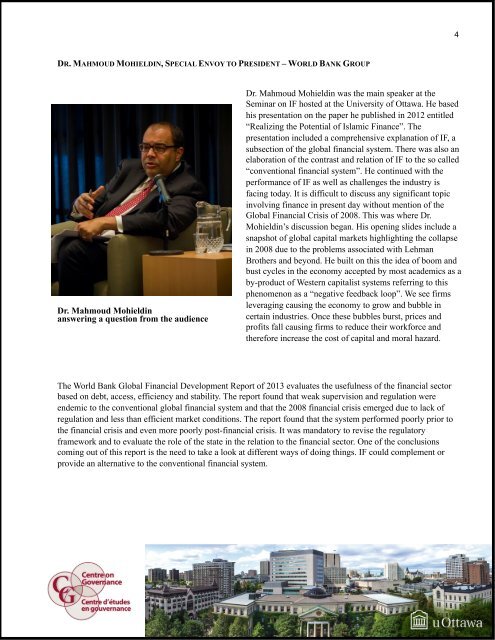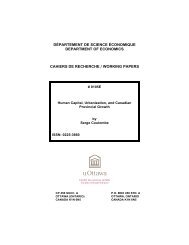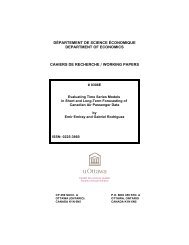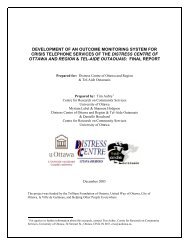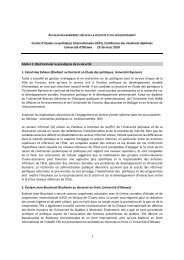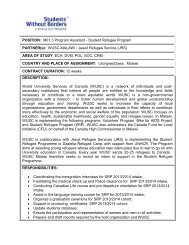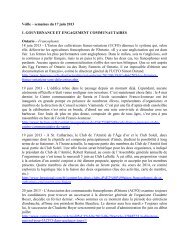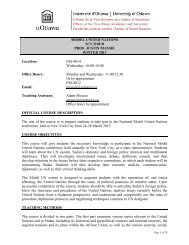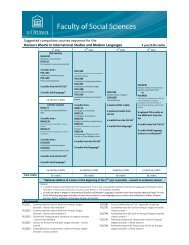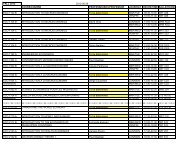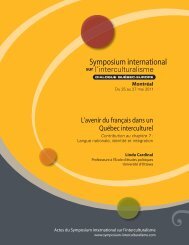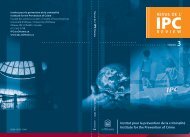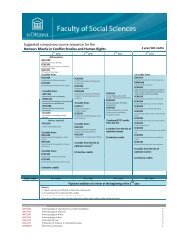Conference Summary Report - Faculty of Social Sciences ...
Conference Summary Report - Faculty of Social Sciences ...
Conference Summary Report - Faculty of Social Sciences ...
You also want an ePaper? Increase the reach of your titles
YUMPU automatically turns print PDFs into web optimized ePapers that Google loves.
! ! 4<br />
DR. MAHMOUD MOHIELDIN, SPECIAL ENVOY TO PRESIDENT – WORLD BANK GROUP<br />
Dr. Mahmoud Mohieldin<br />
answering a question from the audience<br />
Dr. Mahmoud Mohieldin was the main speaker at the<br />
Seminar on IF hosted at the University <strong>of</strong> Ottawa. He based<br />
his presentation on the paper he published in 2012 entitled<br />
“Realizing the Potential <strong>of</strong> Islamic Finance”. The<br />
presentation included a comprehensive explanation <strong>of</strong> IF, a<br />
subsection <strong>of</strong> the global financial system. There was also an<br />
elaboration <strong>of</strong> the contrast and relation <strong>of</strong> IF to the so called<br />
“conventional financial system”. He continued with the<br />
performance <strong>of</strong> IF as well as challenges the industry is<br />
facing today. It is difficult to discuss any significant topic<br />
involving finance in present day without mention <strong>of</strong> the<br />
Global Financial Crisis <strong>of</strong> 2008. This was where Dr.<br />
Mohieldin’s discussion began. His opening slides include a<br />
snapshot <strong>of</strong> global capital markets highlighting the collapse<br />
in 2008 due to the problems associated with Lehman<br />
Brothers and beyond. He built on this the idea <strong>of</strong> boom and<br />
bust cycles in the economy accepted by most academics as a<br />
by-product <strong>of</strong> Western capitalist systems referring to this<br />
phenomenon as a “negative feedback loop”. We see firms<br />
leveraging causing the economy to grow and bubble in<br />
certain industries. Once these bubbles burst, prices and<br />
pr<strong>of</strong>its fall causing firms to reduce their workforce and<br />
therefore increase the cost <strong>of</strong> capital and moral hazard.<br />
The World Bank Global Financial Development <strong>Report</strong> <strong>of</strong> 2013 evaluates the usefulness <strong>of</strong> the financial sector<br />
based on debt, access, efficiency and stability. The report found that weak supervision and regulation were<br />
endemic to the conventional global financial system and that the 2008 financial crisis emerged due to lack <strong>of</strong><br />
regulation and less than efficient market conditions. The report found that the system performed poorly prior to<br />
the financial crisis and even more poorly post-financial crisis. It was mandatory to revise the regulatory<br />
framework and to evaluate the role <strong>of</strong> the state in the relation to the financial sector. One <strong>of</strong> the conclusions<br />
coming out <strong>of</strong> this report is the need to take a look at different ways <strong>of</strong> doing things. IF could complement or<br />
provide an alternative to the conventional financial system.


